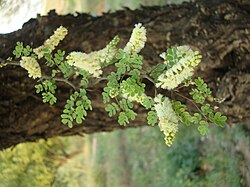This article needs additional citations for verification. (January 2021) |
Senegalia modesta (commonly called phulai[2] in Pakistan, phalāhī ਫਲਾਹੀ پھلاہی (Punjabi) in India) is a species of plant commonly found[3] in Pakistan, India[4] and Afghanistan. S. modesta[5] is a perennial[6] tree and formerly, it was classified as Acacia modesta.[2] The plant is drought tolerant.[7] S. modesta`s tree grow in medium size (3 to almost 5 meters)[8] deciduous form with rough surfaced, brown or greenish grey bark, leaflets as (3-5 pairs), cream colored inflorescence (in April–May or July–August) in the form of pedunculate spike, pods as stipitate having 3-5 seeds inside.[9]
| Senegalia modesta | |
|---|---|

| |
| Scientific classification | |
| Kingdom: | Plantae |
| Clade: | Tracheophytes |
| Clade: | Angiosperms |
| Clade: | Eudicots |
| Clade: | Rosids |
| Order: | Fabales |
| Family: | Fabaceae |
| Subfamily: | Caesalpinioideae |
| Clade: | Mimosoid clade |
| Genus: | Senegalia |
| Species: | S. modesta
|
| Binomial name | |
| Senegalia modesta (Wall.) P. J. H. Hurter[1]
| |
| Synonyms | |
| |
In August, 2018 thousands of phulai trees were planted during the two-day tree plantation for reforestation[3] campaign in Kingyar Gali, District Buner, Khyber Pakhtunkhwa Pakistan.[10]
The tree produces a gum in the form of pale yellow small tears of mucilage.[11][12] This gum (also called gum arabic) is used for emulsification and stabilizing agent in food, cosmetic, textile and pharmaceutical industries.[13] The hard wood of tree is also source of fuel.[14]


References
edit- ^ "Mabberley's plant-book. A portable dictionary of plants, their classification and uses | International Plant Names Index". www.ipni.org.
- ^ a b Rizwan, Syed Ali; Mahmood, Neha; Mahmood, Usman; Bier, Thomas A. (10 February 2018). "Response of self-compacting paste (SCP) systems containing Acacia Modesta gum". Construction and Building Materials. 161: 398–406. doi:10.1016/j.conbuildmat.2017.11.145. ISSN 0950-0618.
- ^ a b "Senegalia modesta - Useful Temperate Plants". temperate.theferns.info.
- ^ "The genus Acacia P. Miller (Leguminosae: Mimosoideae) in India". www.cabi.org. 1996.
- ^ Kyalangalilwa, Bruce; Boatwright, James S.; Daru, Barnabas H.; Maurin, Olivier; van der Bank, Michelle (20 May 2013). "Phylogenetic position and revised classification of Acacia s.l.(Fabaceae: Mimosoideae) in Africa, including new combinations inVachelliaandSenegalia". Botanical Journal of the Linnean Society. 172 (4): 500–523. doi:10.1111/boj.12047. hdl:10566/3454.
- ^ "Senegalia modesta (Wall.) P.J.H.Hurter | Plants of the World Online | Kew Science". Plants of the World Online.
- ^ "PlantFiles: Senegalia Species, Blackwood, Black Sally, Phullai". Dave's Garden.
- ^ "Senegalia modesta".
- ^ "Phulai Tree : Senegalia modesta".
- ^ "Volunteers plant 150,000 trees in parts of District Buner". www.geo.tv.
- ^ Lambert, Joseph B.; Heckenbach, Eric A.; Hurtley, Anna E.; Wu, Yuyang; Santiago-Blay, Jorge A. (26 June 2009). "Nuclear Magnetic Resonance Spectroscopic Characterization of Legume Exudates". Journal of Natural Products. 72 (6): 1028–1035. doi:10.1021/np900188j. ISSN 0163-3864. PMID 19492830.
- ^ Nussinovitch, Amos (21 December 2009). Plant Gum Exudates of the World: Sources, Distribution, Properties, and Applications. CRC Press. ISBN 978-1-4200-5224-4.
- ^ Massey, Shazma; MacNaughtan, William; Williams, Huw E.L.; Wolf, Bettina; Iqbal, Mohammad S. (1 November 2017). "A structural study of Acacia nilotica and Acacia modesta gums". Carbohydrate Polymers. 175: 207–215. doi:10.1016/j.carbpol.2017.07.065. ISSN 0144-8617. PMID 28917858.
- ^ "Acacia modesta in Flora of Pakistan @ efloras.org". www.efloras.org.